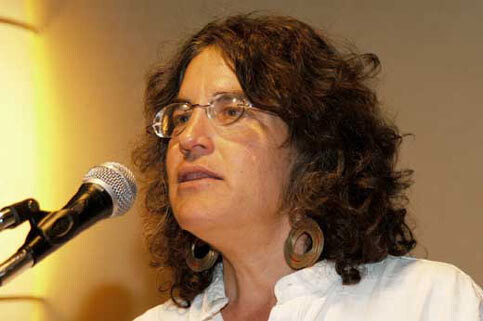Palestine Center 6 May 2004

Phyllis Bennis of the Institute for Policy Studies, addresses the opening plenary at a United for Peace and Justice conference in Chicago, 6-8 June 2003. (Photo: Diane Greene Lent)
Israeli Prime Minister Ariel Sharon claims that his pullout from Gaza will end Israel’s responsibility for the Palestinian population. However, Phyllis Bennis of the Institute for Policy Studies pointed out that under international law the besieging power has the same responsibilities for the population it is besieging as an occupying power has for a population living under occupation. Bennis spoke at the Palestine Center on Monday April 26th, having just returned from a fact-finding mission to the Occupied Palestinian Territories.
Bennis noted that all the evidence is that Palestinians will remain under siege in the event of an Israeli pullout. Israel would retain control over what it calls the “Gaza envelope.” This means that although settlers would leave the Strip, Israel would control the airspace, coastline, border with Egypt and every point of interaction between Gaza and the outer world. Bennis made the point that withdrawing the settlers from Gaza is not itself a great difficulty. Most of them are not fundamentalists motivated by messianic visions such as those who have settled in the West Bank. They are rather economic opportunists taking advantage of the subsidized housing and other incentives for settlement. Furthermore, there are only about 7,000 settlers, and almost four times that many soldiers are required to protect them.
Nor is the Gaza “disengagement” plan a new idea. Bennis recalled that Sharon has since the late 1970s publicly advocated a plan for the West Bank and Gaza that has all the same essential features as what he plans today. The “pullout” from Gaza, combined with the Wall that will cut off around half of the West Bank, will leave the skeleton of a Palestinian “state” which Sharon has always envisioned. Israel will control both areas on all sides and in the air. Bennis pointed out that according to the text of Sharon’s plan for Gaza, Israel would even refuse the Palestinians the right to host an international peacekeeping force in their territory.
Meanwhile, Israel is continuing to engage in attacks against Palestinians in the Gaza Strip. Bennis reported that the United States Government had foreknowledge of the Israeli extra-judicial assassinations of spiritual leader of the Islamic Resistance Movement (Hamas) Sheikh Ahmed Yassin followed by the assassination of Hamas’s political head Abd Al Aziz Rantisi. Though U.S. spokespeople have denied knowing of the assassinations beforehand, or giving their approval, Bennis revealed that the United States Agency for International Development (U.S. AID) had sent email warnings to its employees in Gaza days before both assassinations warning them to avoid visiting Gaza. Employees who were U.S. citizens were asked to leave Gaza. She had received copies of the email warnings in question.
Overall, the U.S. response to Sharon’s plan does not surprise Bennis. Although George W. Bush reversed decades of official U.S. policy when he endorsed the plan on April 15th, including Israeli annexation of huge illegal settlement blocs in the West Bank, construction of the Wall, and denial of the Palestinian right of return, Bennis noted this was a shift in rhetoric rather than in practice.
She added that the U.S. policy does demonstrate a complete abandonment of international law and an appropriation by the U.S. of the role of negotiator on behalf of the Palestinians. In this capacity the U. S. has attempted to relinquish the right of return for Palestinian refugees. Bennis pointed out that the right of return is an individual right that is held by refugees and no government or other agency can surrender it on their behalf.
By excluding the Palestinian Authority from negotiations, Sharon and Bush have tried to visit the “ultimate political humiliation” on the Palestinian people, equivalent to the physical humiliation Palestinians endure at Israeli checkpoints. But Bennis insists that the international community must stick to its legal principles and reject this latest usurpation of the legitimate rights of the Palestinian people.
Meanwhile, living conditions in the Occupied Territories are worsening steadily. Bennis reported that West Bank doctors are noticing an alarming increase in medical conditions relating to stress, such as diabetes, hypertension and other serious diseases. The bonds of social solidarity that had formerly sustained Palestinian communities are being dissolved, warned Bennis. Where formerly people in dire straits would turn to a relative or neighbor for help, today everyone is in the same situation and people are forced to concentrate on their own lives just to survive. In the West Bank, people are deprived, but in Gaza there is real hunger and malnutrition. Peter Hansen, director of the United Nations Relief and Works Association (UNRWA), told Bennis that UNRWA’s original goal was to supply the refugees in Gaza with 60% of what is considered the minimum caloric intake for health. That goal has steadily dropped until now UNRWA is only able to provide its dependents with 20% of what they need.
Related Links
Phyllis Bennis is a Fellow at the Institute for Policy Studies, Project Director of the New Internationalism project and a Fellow at the Transnational Institute in Amsterdam. The above text is based on remarks delivered on 26 April 2004 by Phyllis Bennis and was first published in For the Record No. 194, 29 April 2004. The speaker’s views do not necessarily reflect the views of The Jerusalem Fund or the Palestine Center. This “For the Record” may be used without permission but with proper attribution to the Palestine Center.